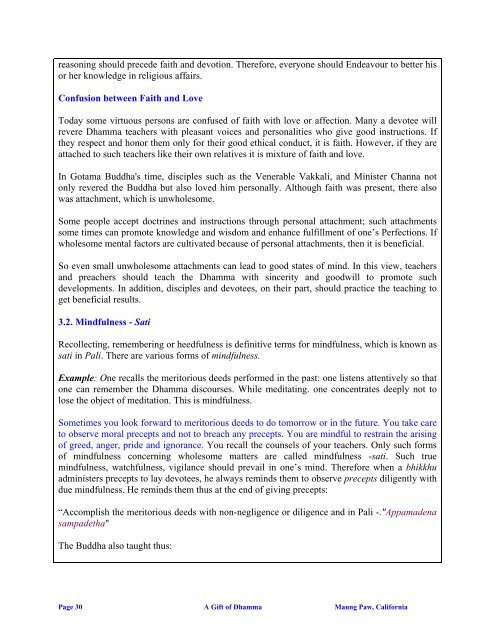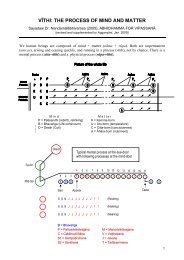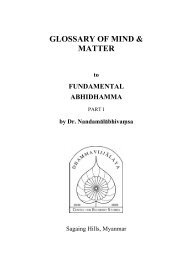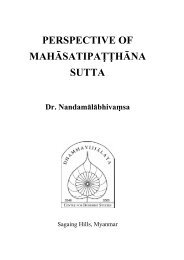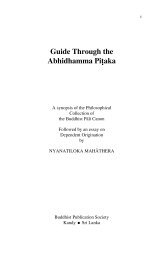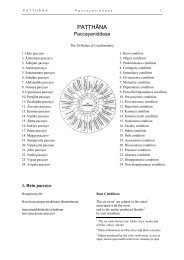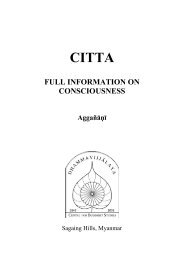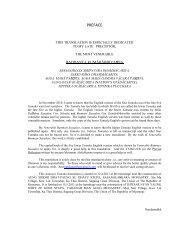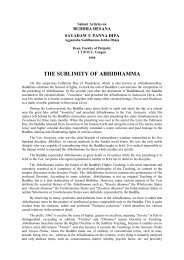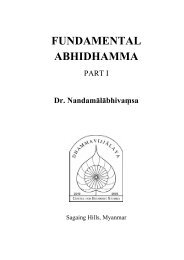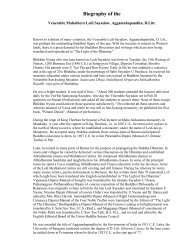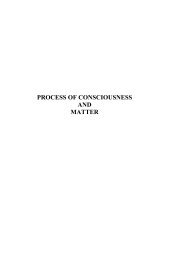ABHIDHAMMA IN DAILY LIFE - Abhidhamma.com
ABHIDHAMMA IN DAILY LIFE - Abhidhamma.com
ABHIDHAMMA IN DAILY LIFE - Abhidhamma.com
You also want an ePaper? Increase the reach of your titles
YUMPU automatically turns print PDFs into web optimized ePapers that Google loves.
easoning should precede faith and devotion. Therefore, everyone should Endeavour to better his<br />
or her knowledge in religious affairs.<br />
Confusion between Faith and Love<br />
Today some virtuous persons are confused of faith with love or affection. Many a devotee will<br />
revere Dhamma teachers with pleasant voices and personalities who give good instructions. If<br />
they respect and honor them only for their good ethical conduct, it is faith. However, if they are<br />
attached to such teachers like their own relatives it is mixture of faith and love.<br />
In Gotama Buddha's time, disciples such as the Venerable Vakkali, and Minister Channa not<br />
only revered the Buddha but also loved him personally. Although faith was present, there also<br />
was attachment, which is unwholesome.<br />
Some people accept doctrines and instructions through personal attachment; such attachments<br />
some times can promote knowledge and wisdom and enhance fulfillment of one’s Perfections. If<br />
wholesome mental factors are cultivated because of personal attachments, then it is beneficial.<br />
So even small unwholesome attachments can lead to good states of mind. In this view, teachers<br />
and preachers should teach the Dhamma with sincerity and goodwill to promote such<br />
developments. In addition, disciples and devotees, on their part, should practice the teaching to<br />
get beneficial results.<br />
3.2. Mindfulness - Sati<br />
Recollecting, remembering or heedfulness is definitive terms for mindfulness, which is known as<br />
sati in Pali. There are various forms of mindfulness.<br />
Example: One recalls the meritorious deeds performed in the past: one listens attentively so that<br />
one can remember the Dhamma discourses. While meditating. one concentrates deeply not to<br />
lose the object of meditation. This is mindfulness.<br />
Sometimes you look forward to meritorious deeds to do tomorrow or in the future. You take care<br />
to observe moral precepts and not to breach any precepts. You are mindful to restrain the arising<br />
of greed, anger, pride and ignorance. You recall the counsels of your teachers. Only such forms<br />
of mindfulness concerning wholesome matters are called mindfulness -sati. Such true<br />
mindfulness, watchfulness, vigilance should prevail in one’s mind. Therefore when a bhikkhu<br />
administers precepts to lay devotees, he always reminds them to observe precepts diligently with<br />
due mindfulness. He reminds them thus at the end of giving precepts:<br />
“Ac<strong>com</strong>plish the meritorious deeds with non-negligence or diligence and in Pali -."Appamadena<br />
sampadetha"<br />
The Buddha also taught thus:<br />
Page 30 A Gift of Dhamma Maung Paw, California


